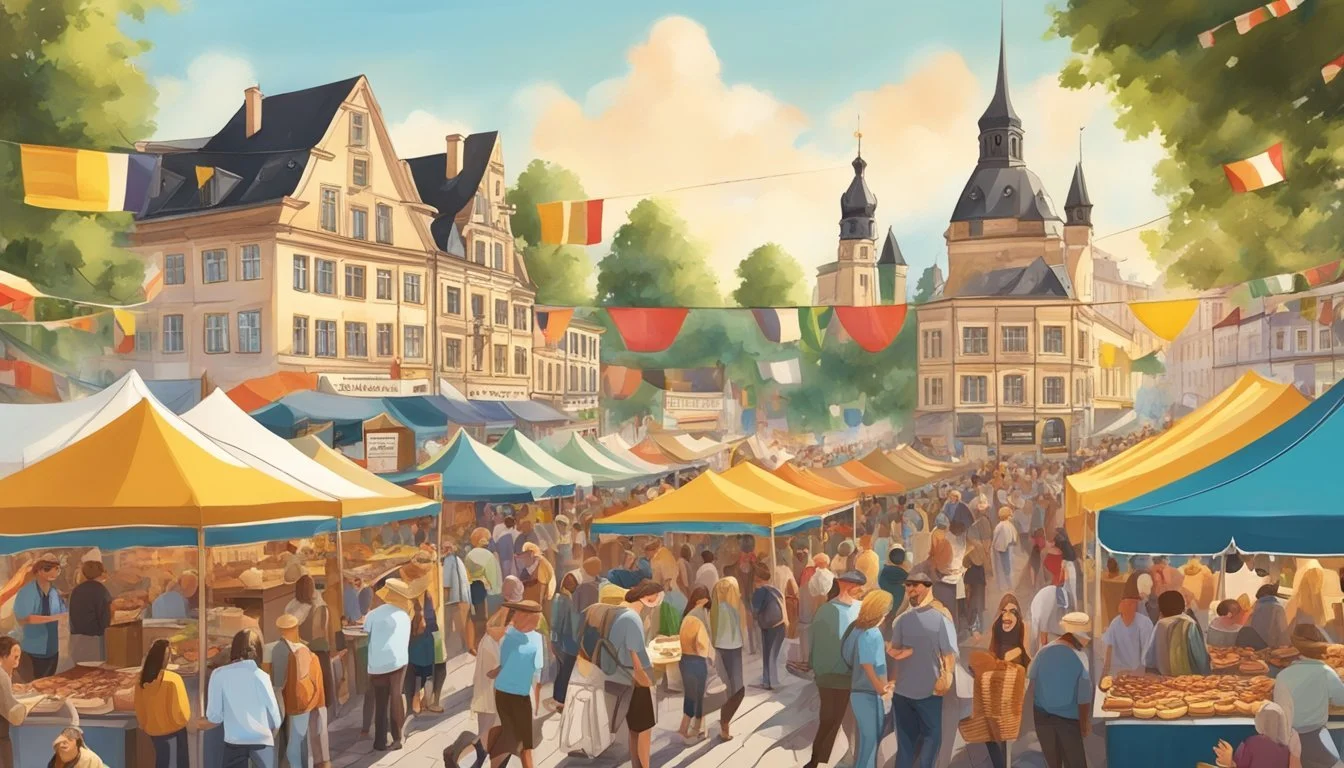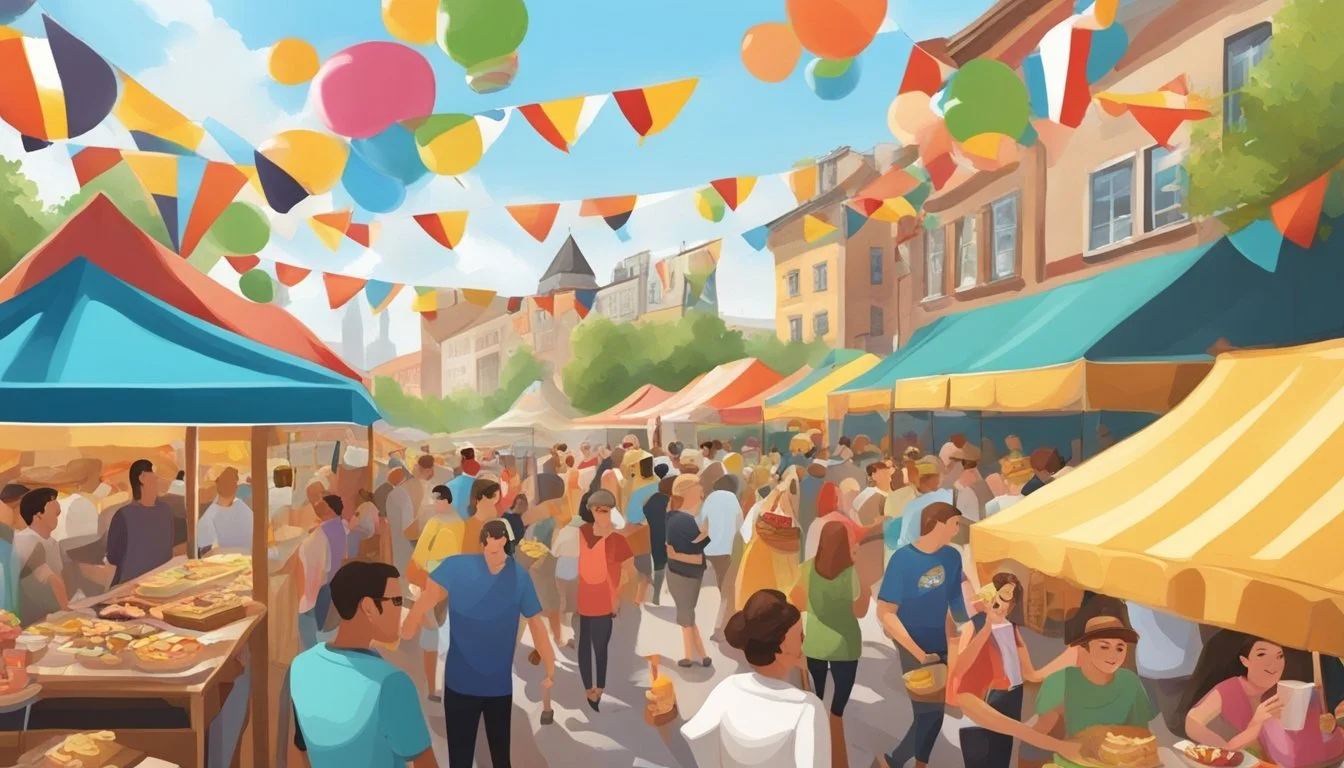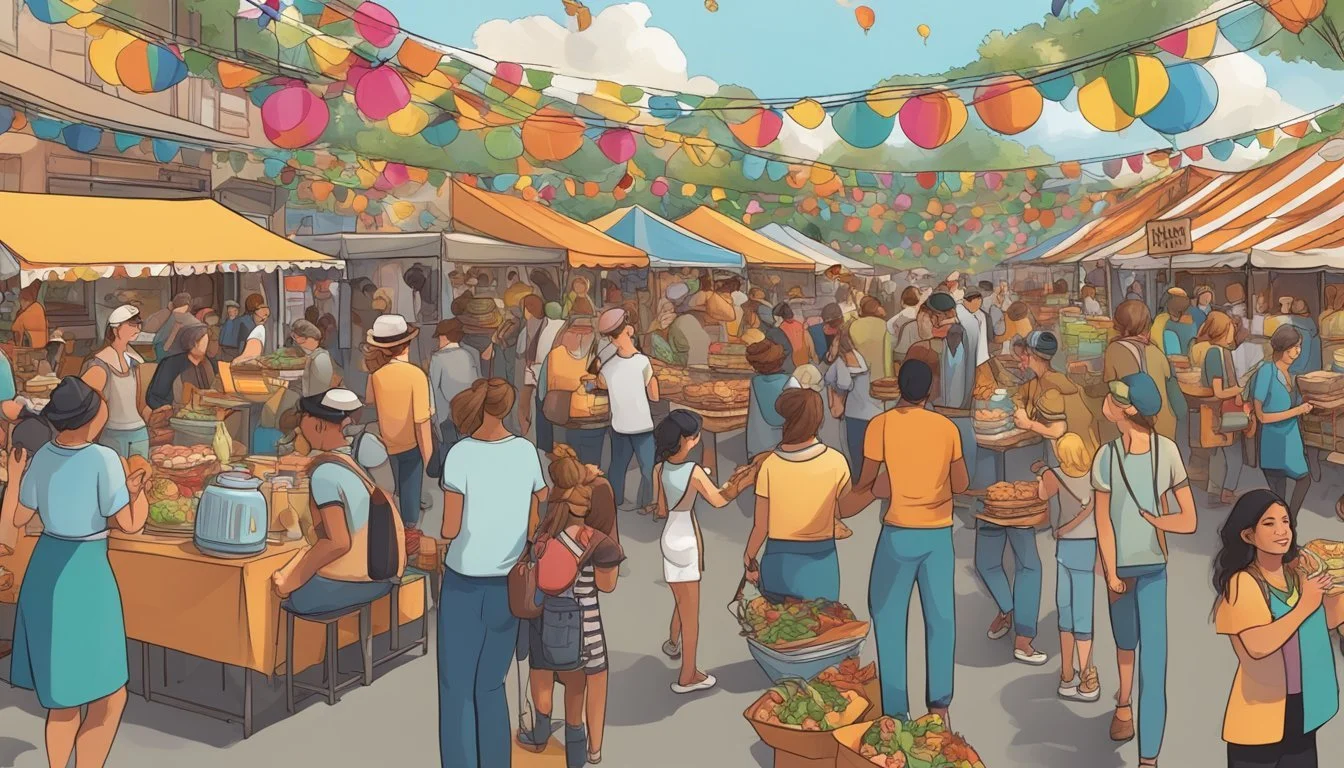German Texan Food Festivals and Culinary Events
A Guide to the State's Best Flavors
Texas, with its diverse cultural tapestry, has been significantly shaped by German roots that trace back to the early migration of German immigrants in the 19th century. These immigrants brought with them rich culinary traditions which have since become a staple of Texan heritage. Celebrating these roots, numerous food festivals across the state pay homage to this integral part of the Texan cultural mosaic.
These events capture the essence of German culture through a delightful fusion of traditional dishes and vibrant festivities, reflective of the strong German influence that persists in Texas. The German-Texan Heritage Society, among other cultural organizations, continues to foster the appreciation of this heritage. Through annual festivals like Oktoberfest and Wurstfest, they invite locals and visitors alike to indulge in an authentic smorgasbord of German-Texan cuisine.
The longevity and popularity of these celebrations bear testimony to the lasting impact that Germans have had on Texan society. For many Texans, these culinary events offer a portal to a past where German migrants shaped a new identity, intertwining their customs with the broader Texan lifestyle, from sausages and beers to the lively sounds of oompah music. It's not just a feast for the palate but also an echo of history that endures in the heart of Texas.
Historical Context of German Influence in Texas
German influence in Texas dates back to the early 19th century and has had a profound impact on the state's cultural and culinary landscape. This section explores the German footprint through the phases of early settlement, societal integration, and their lasting culinary legacy.
Early Settlement and Colonization
German immigrants began arriving in Texas during the 1830s, when empresario Stephen F. Austin invited settlers to the region to bolster economic growth. The Texas State Historical Association notes that these settlers established significant communities within Stephen F. Austin's colony and surrounding areas. This period saw the Republic of Texas welcoming a substantial number of Germans, many of whom were fleeing political unrest and economic hardships in their homeland.
Integration into Texan Society
By the mid-19th century, Germans represented a considerable portion of the Texan population. Their integration into Texan society was marked by the rich cultural tapestry they wove through their traditions, language, and public life. German heritage became intertwined with Texan culture as they established schools, churches, and newspapers in German, influencing local governance and community events. Many became successful entrepreneurs and influential political figures, thereby cementing their role in the shaping of Texas.
Culinary Legacy
The German community's culinary influence in Texas is undeniable. They introduced a variety of foods and culinary techniques to the state, including sausages, pastries, and beer. Festivals like Wurstfest in New Braunfels celebrate these traditions annually, attracting over 100,000 visitors who enjoy German-Texan cuisine. German bakers and butchers left their mark, with their bread and meat preparations becoming staples, influencing the Texan diet and contributing to the region’s food culture.
Annual Celebrations and Events
Texas boasts a rich German heritage which is celebrated through various annual culinary events. These festivals highlight the fusion of German culture with Texas's vibrant community, showcasing traditional foods, beverages, and festivities.
Oktoberfest Celebrations
Oktoberfest celebrations occur across Texas, with many towns hosting their unique versions of this traditional German festival. Oktoberfest in Fredericksburg, a city with deep German roots, is a notable example. Visitors enjoy authentic German food, bier, and music. These festivities typically feature a variety of German-style brews and culinary delights, reflecting the city's strong cultural ties.
Wurstfest in New Braunfels
Wurstfest is a 10-day event that celebrates New Braunfels' German heritage through food and fun. Scheduled from November 1 to 10, this festival boasts over a century of history and has become a staple for sausage aficionados. Attendees can sample a plethora of wurst, engage in Bavarian-style celebrations, and participate in events that highlight German Texan culture.
Fredericksburg Food and Wine Fest
The Fredericksburg Food and Wine Fest is a gastronomic delight, enveloping attendees in the flavors of Texas and its German influences. The festival is not only about indulging in fine wine but also about experiencing the culinary prowess of the region. With an emphasis on local produce and German culinary traditions, the festival offers a variety of wines, specialty foods, and cooking demonstrations.
Festival Highlights and Attractions
German Texan festivals are vibrant showcases of cultural heritage, featuring a medley of music, dance, traditional carnival experiences, and marketplaces brimming with goods. These festivals present a unique intersection of Texan grit and German tradition, providing attendees with an array of immersive attractions.
German Music and Dance Performances
Live German music is the heartbeat of these events, with polka bands and accordionists setting the festive mood. Dance troupes perform traditional German dances, often inviting attendees to learn and join in. These performances are central to the festival atmosphere, embracing the joy and community spirit of German culture.
Carnival Rides and Games
The carnival portion of the festivals offers an array of classic rides and games suitable for all ages. From thrilling roller coasters to family-friendly carousels, the carnival rides provide a fun-filled backdrop to the event. Visitors can also indulge in games of skill and chance, competing for prizes while enjoying the lively ambiance.
Vendor and Market Experiences
Biergartens and food vendors provide a taste of Germany with a Texan twist, offering everything from savory bratwursts to sweet strudels. Market stalls feature a variety of goods, where artisans sell handmade crafts, clothing, and traditional German items. These market experiences not only cater to the culinary enthusiasts but also to those seeking unique cultural artifacts.
Authentic German-Texan Culinary Delights
Immersing oneself in German-Texan festivals provides an opportunity to relish the distinct coupling of German culinary traditions with Texan flavors. These events serve as a showcase for the rich array of meat dishes, baked goods, and beverages that arise from this unique cultural synthesis.
Meat Dishes and Sausages
German-Texan cuisine takes pride in its hearty meat dishes, particularly sausages. Events like Wurstfest in New Braunfels celebrate this love affair with sausage. Visitors can savor a variety of sausages such as bratwurst, a finely chopped sausage typically made from pork, and other delicacies including schnitzel — a breaded pork cutlet, and savory bavarian meat loaf. For an added local twist, some dishes may be served with sides like mashed potato balls or German potato pancakes known as 'hausgemachte'.
Breads, Pretzels, and Pastries
The influence of German and Czech settlers is particularly evident in the baked goods at these festivals. Attendees can expect to find an assortment of pretzels, ranging from the classic knot to sticks and rolls, all displaying the characteristic soft interior and a golden crust. Additionally, visitors should not miss out on trying strudel, a layered pastry with sweet fillings, often apple, and the iconic Black Forest cake, a chocolate sponge cake layered with cherries and whipped cream.
Beer and Beverage Gardens
No German-Texan festival is complete without a beer garden, where a variety of German-style beers are on tap. From light pilsners to robust dunkels, these beverage gardens provide a relaxed setting for sipping traditional German beers. Along with beer, one can often find other German beverages like glühwein (mulled wine), especially during colder months, enhancing the authentic German-Texan experience.
Cultural Impact of German Heritage on Texan Gastronomy
The fusion of German culinary traditions with Texan ingredients has led to a distinctive and flavorful gastronomy that celebrates both cultures. From festivals featuring hearty sausages to bakeries laden with decadent desserts, the German influence is profoundly seen and tasted across the Lone Star State.
Local Ingredient Use and Recipe Adaptation
In the heart of Texas Hill Country, the German legacy thrives through a unique adaptation of traditional recipes using local produce. Sausages, a Bavarian specialty, are crafted with Texan wild game, merging local flavors with German techniques. Bakeries reflect this blend by incorporating native pecans and peaches into classic desserts like streusel and kuchen. Wineries in the region nod to German heritage by cultivating varieties reminiscent of those found in Bavaria, while cheese-making follows the footsteps of German craftsmanship, often using Texan milk.
Krause’s Cafe in New Braunfels showcases this cross-cultural culinary exchange by offering a Wild Game Plate, featuring meats such as venison (What wine goes well with venison?), which are native to Texas yet prepared with German seasonings and methods. Little Gretel in Boerne honors this tradition with their renowned Kasseler Rippchen, a smoked pork dish, and Gretel’s Apple Strudel – a nod to both local apple harvests and authentic German pastry skills.
German-Themed Restaurants and Bakeries
A number of eateries throughout Texas specialize in German cuisine (What Wine Pairs Perfectly With German Cuisine), acting as cultural ambassadors of German gastronomy. Schilo’s in San Antonio, one of the oldest restaurants in the area, serves up homemade root beer alongside hearty fare. Der Lindenbaum in Fredericksburg invites diners to experience authentic flavors in dishes like spaetzle and other regional specialties, crafted by chefs like Ingrid Hohmann who uphold the culinary traditions.
The sweet side of German influence is celebrated in local bakeries, where fresh-baked goods such as Hansel’s Kisses cookies and various pastries provide an enchanting taste of heritage. These establishments not only honor the past but also serve as a daily reminder of the enduring German influence on Texan food culture.
Regional Variations and Specialties
Amid the expansive Texan landscape lie enclaves of German culinary heritage, giving rise to a variety of food festivals and culinary events. These regions offer a unique tasting experience rooted in German tradition blended with Texan influences.
Hill Country German Cuisine
The Texas Hill Country is renowned for its German heritage, particularly in Fredericksburg and New Braunfels, where sauerkraut and kartoffelpuffer are menu staples. An example of the fusion cuisine can be found during local food festivals, where these traditional dishes are often enjoyed alongside Texan barbecue. Visitors to the Walburg Restaurant can savor authentic German cuisine in a setting reminiscent of a lively German biergarten.
San Antonio's German Eateries
In San Antonio, German food enthusiasts gather at Scholz Garten, the oldest beer garden in Texas, offering a taste of Germany's biergarten culture right in the heart of the city. Schnitzel Sammy is a local favorite, demonstrating how these traditional offerings have been adapted for Texan appetites, often served in more casual, street-food settings. San Antonio's German establishments provide a blend of German and Texan hospitality, often featuring menus with à la carte options that allow diners to curate their own German-Texan dining experience.
Boerne's Teutonic Tastes
Boerne, a small town in the Texas Hill Country, showcases its German roots through traditional dishes like rinderrouladen, a savory meat roll-up, and a variety of wurst served in local eateries. The Alpine Haus stands out for its faithful representation of German cuisine, giving guests a refined dining experience with dishes carefully prepared following traditional recipes. Food festivals in Boerne celebrate this heritage, often featuring live music and dance, making for an immersive cultural experience.
Cultural Preservation and Education
Preservation of German heritage in Texas encompasses both vibrant festivals and educational initiatives that spotlight the state's Teutonic roots. These efforts not only maintain traditions but also offer learning opportunities for all ages.
German Festivals as Heritage Sites
German festivals such as Wurstfest in New Braunfels and Oktoberfest serve as living heritage sites. The largest among them, Wurstfest, is a 10-day event in November attracting over 100,000 guests. It celebrates German-Texan culinary traditions with ample servings of sausage and beer. The festivals act as a hub for cultural exchange and provide a space for the public to engage with German heritage through food, music, and dance.
Educational Programs and Societies
The German-Texan Heritage Society (GTHS), founded in 1978, plays an essential role in the cultural education landscape. Located in Austin, GTHS offers German language classes for both adults and children. It organizes a variety of events, including:
Maifest
Oktoberfest
Christmas Market
These events serve as educational platforms to impart knowledge about German culture. The society also operates in various capacities to encourage educational growth and cultural understanding, ranging from genealogy research to round table discussions. The Texas State Historical Association also contributes to the educational aspect by documenting the state's German influences, such as the contribution of August Scholz, whose establishment is considered the oldest operating business in Austin, furthering the appreciation of German Texan history in locales like Blanco.
Impacts of Global Events on Festivals
Global events have a profound impact on festivals, particularly seen in how they adapt to challenges and strive to maintain cultural traditions.
Response to the Coronavirus Pandemic
The coronavirus pandemic necessitated unprecedented changes to festival organization worldwide. German Texan food festivals, traditionally rich in communal dining and merrymaking, had to either postpone, cancel, or transform into virtual and socially distanced events. For example, Carnival celebrations, which typically involve large gatherings, had to be scaled down considerably or moved to online platforms. Teutonic watering holes faced stringent regulations, limiting the cherished practice of communal beer tasting and dining.
Preservation of Traditions in Changing Times
In the face of global upheavals, festivals play an essential role in preserving cultural heritage. Amidst the pandemic, organizers of German Texan culinary events emphasized the importance of maintaining these traditions. They introduced innovative concepts like drive-through tastings and take-home meal kits to continue offering authentic German-Texan experiences. This ensured that the time-honored rituals and community spirit of these festivals could endure, maintaining a sense of normalcy and continuity during turbulent periods.
Conclusion
German immigrants have significantly shaped cultural and gastronomic landscapes in Texas. Their influence is most vividly celebrated through food festivals, with the Wurstfest in New Braunfels being one of the standout events. Here, over 100,000 attendees revel in 10 days of German culinary traditions in November, including sampling sausages and savoring beers.
Beyond festivals, the culinary integration is evident across Texan cuisine. German techniques and flavors meld with Texan staples, creating a fusion beloved by many. Pastries and baked goods are particularly indicative of this blend, representing a marriage of European confectionary skills with Lone Star hospitality.
In Austin and Central Texas, heritage events like the mentioned Wurstfest underscore the German roots with authentic food, lively music, and dance. Texans thus honor the legacy of German culture, weaving it into the fabric of their community life. German Texan festivals serve as a testament to the enduring connection between these two rich cultures and are integral in carrying on the traditions and communal spirit of the early settlers.
In summary, the synthesis of German traditions within Texan culture underscores the diversity and adaptability of the state's gastronomic offerings. The enduring popularity of these festivals highlights a collective appreciation for history, heritage, and the simple joy of good food and camaraderie.






